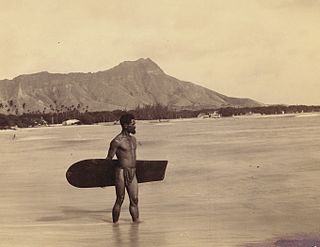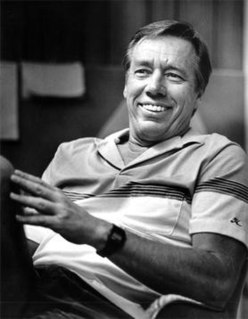
Surfing is a surface water sport in which the wave rider, referred to as a surfer, rides on the forward or deep face of a moving wave, which usually carries the surfer towards the shore. Waves suitable for surfing are primarily found in the ocean, but can also be found in lakes or rivers in the form of a standing wave or tidal bore. However, surfers can also utilize artificial waves such as those from boat wakes and the waves created in artificial wave pools.

The Hobie Cat is a small sailing catamaran manufactured by the Hobie Cat Company. Hobie's line of products ranges from surfboards to catamaran sailboats to kayaks and stand-up paddle boards, though the Hobie Cat Company is most famous around the world for its catamarans. Hobie also designed a very successful monohull, the Hobie 33.

Skip Frye is an American surfer, surfboard designer and shaper, and environmental activist and legend.
Clark Foam was a Californian manufacturer of surfboard blanks — foam slabs, reinforced with one or more wooden strips or "stringers" — cast in the rough shape of a surfboard and used by surfboard shapers to create finished surfboards. Founded in 1961 by Gordon "Grubby" Clark, Clark Foam established a near-monopoly on the American market, and a strong presence in the international market, which it held until the company's unexpected closure in 2005.
Mickey Munoz, nicknamed "The Mongoose", was born in New York City in 1937 and is one of the early pioneers of surfing but is perhaps more famous for his work as a surfboard shaper. Munoz, a historical figure in the surfing world, has been featured in many popular surfing documentaries such as the 2004 film Riding Giants. He currently resides in Capistrano Beach, California and designs boards for Surftech, a manufacturer of epoxy boards.
Robert August is an American surfer and surfboard shaper. Raised in Seal Beach, California, he attended Huntington Beach High School where he was ASB President his senior year. He is most famous as one of the subjects of Bruce Brown's 1966 surf documentary The Endless Summer, along with his friend Mike Hynson. The film follows the two around the world pursuing their hobby during the California offseason, meeting other surfers and discussing surf culture.

Paddleboarding participants are propelled by a swimming motion using their arms while lying, kneeling, or standing on a paddleboard or surfboard in the ocean. This article refers to traditional prone or kneeling paddleboarding. A derivative of paddleboarding is stand up paddleboarding also called stand up paddle surfing. Paddleboarding is usually performed in the open ocean, with the participant paddling and surfing unbroken swells to cross between islands or journey from one coastal area to another. Champion paddlers can stroke for hours and a 20-mile (32 km) race is only a warm-up for well-trained paddlers.
Bruce Jones was a founding pioneer in the surfboard shaping industry.
Dane Reynolds is an American professional surfer from Ventura, California. He is known for his "go for broke" style of surfing that includes many experimental and aerial maneuvers.

David Earl Weber, known as Dewey Weber, was an American surfer, a popular surfing film subject, and a successful surfboard manufacturing businessman.

An alaia is a thin, round-nosed, square-tailed surfboard ridden in pre-20th century Hawaii. The boards were between 7 and 12 ft long, weighed up to 100 lb (45 kg), and were generally made from the wood of Acacia koa. They are distinct from modern surfboards in that they have no ventral fins, and instead rely on the sharpness of the edges to hold the board in the face of the wave.
Philip Rube "Flippy" Hoffman was a legendary big wave surfing pioneer and businessman.
Dale Velzy was an American surfboard shaper, credited with being the world's first commercial shaper. He opened the first professional surf shop in Manhattan Beach, California in 1950, personally hand fashioning the surfboards from wood or synthetic material. By 1960, Velzy owned five retail shops and three production facilities in California and Hawaii. He was known as "Hawk" for his keen eyesight.
Donald Moke Takayama was an American professional surfer and surfboard shaper. Originally a longboard surfer, Takayama won the Master's division of the United States Surfing Champions in 1971, 1972 and 1973. Hawaiian born, Takayama learned to surf at Waikiki Beach and moved to California in the mid-1950s. Takayama died of complications from heart surgery; he is survived by his wife and four daughters.
Reynolds "Renny" Yater is a surfboard builder. He was one of the first commercial surfboard builders of the 1950s. Yater shaped fiberglass boards in the early 1950s, worked for Hobie in the mid-1950s on balsa boards and in 1957 went to work for Dale Velzy's shop in San Clemente, California shaping balsa boards. He opened Yater Surfboards in the fall of 1959 on Anacapa Street in Santa Barbara before moving the shop to Summerland, California in 1961. In 1964 zoning laws changes and in 1965 the shop opened on Gutierrez Street along with a retail surf shop at 401 State Street. In 1967 the shaping operation moved to Gray Avenue. The retail shop closed in 1971. His board designs include the Yater Spoon, Nose Specializer and Pocket Rocket. Customers included Joey Cabell, Gordon Clark, Mickey Dora, Philipi Pomar, Kemp Auberg, Bob Cooper, Bruce Brown and John Severson. Another Yater retail store opened in 1991 at 10 State Street in Santa Barbara and continues in business with Yater's son Lauren at the helm.

Chris Christenson is an American surfboard shaper, craftsman, and outdoor enthusiast.








